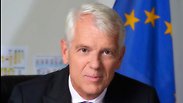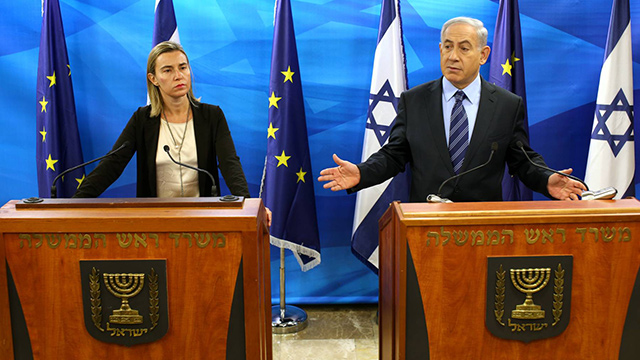
Boycott? What boycott?
Op-ed: Israel and the European Union enjoy a mutually beneficial relationship in ground-breaking scientific research, and the EU delegation to Israel plays a key role.
The slogan of Israel Science Day, held this year on May 12, is "Science is everywhere". In scores of events throughout the country, the general public, especially young people, will be exposed to lectures and demonstrations on how science affects all of us in our daily lives.
Israel has good reason to be proud of its outstanding scientific achievements. However I wonder how many Israelis are aware of the important role that Europe has played in turning the ideas generated by Israel's excellent scientists into real research projects.
The EU's cooperation with Israel in the field of science and technology took a giant leap forward in 1996, when Israel joined one of the EU's seven-year R&D Framework Programmes. It was raised to its highest level last year when Israel became associated to the EU's 80 billion euro Horizon 2020 program, the biggest research program in the world. To this day, Israel is the only non-European country in the world to be fully associated to such programs.

To give you an idea of what this means in practice, during the last framework program - FP7 (2007-2013) – close to 2,000 Israeli researchers participated in 1,612 projects for which they received a total of euro 875.08 million, approximately 1.6 times the amount that Israel invested in the program. Almost 70% of funding went to institutions of higher education and FP7 became the Israel's leading source of competitive public funding for civil R&D.
But participation in the EU Framework Programmes is about much more than euros and shekels. Israeli academia and industry are exposed to European research, to leading European institutions and key actors in the private sector.
Under the current program and its predecessors, Israeli scientists are conducting ground-breaking research together with European partners, including developing the "Sniffphone" system for early cancer detection, which can be operated through a smartphone, teaching the blind to see through their ears by translating visual images into sounds, designing low-cost, simple water purification systems using renewable energy – just to mention a few examples.
And there is more. For example, every year Israel, supported by the Framework Programmes, organizes Researchers Night, an event mirrored all over Europe whose purpose, like that of Israel Science Day, is to bring science to the general public and to instill a passion for science in young people.
The EU Delegation to Israel also plays a role. This year we will be holding the 5th annual EU-Israel Innovation Seminar, bringing together innovation experts to exchange ideas and forge the basis for future collaboration. Last year participants visited from 13 EU countries. I recently handed out awards to the winners of the Israel Young Scientists Contest who will be participating in the EU Contest for Young Scientists, which will take place in Milan in September
This is not a one way street. Europe too benefits from its scientific partnership with Israel and from the excellence of its researchers. Investing in R&D leads to improved economic performance and higher prosperity. We look with admiration at Israel with its investment of over 4% of its GDP in R&D, whereas the EU's goal is to reach an average of 3% by 2020.
The close EU-Israel partnership in science and technology is more than just a success story. It is a model for the type of close relations we hope will continue and which we would like to see in more fields in the future.
Lars Faaborg-Andersen is the European Union's ambassador to Israel.










